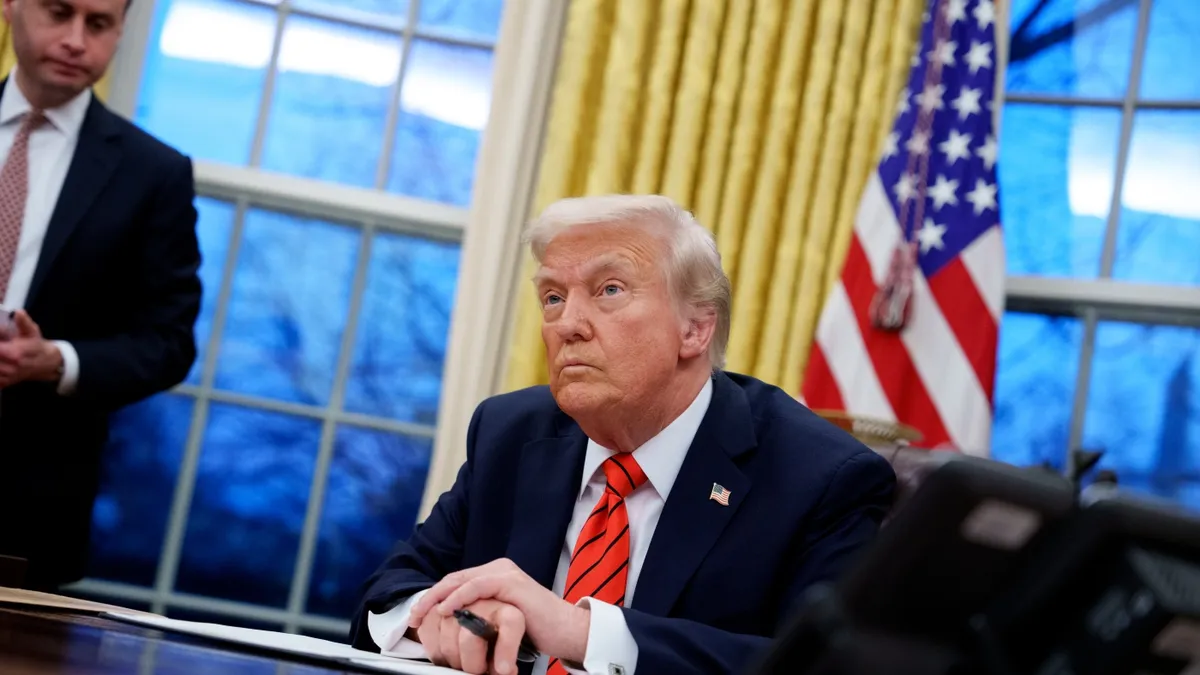
Good morning! You're reading the Up First newsletter, your daily source for essential news updates. Today's top story highlights a significant development in U.S. trade policy. President Trump has announced that tariffs on imported steel and aluminum will be doubled from 25% to 50%. This latest move is part of the president's ongoing trade war, which aims to protect domestic steel and aluminum workers.
However, critics of the new tariffs argue that this decision will likely lead to higher costs for American businesses and consumers who rely on these materials. H.O. Woltz, a North Carolina businessman who specializes in twisting steel wire into cables for reinforced concrete, expressed his concerns during an interview with NPR. He stated that while tariffs are intended to protect U.S. industries, they won't change the fact that China continues to dominate the global market. Woltz fears that the increased costs associated with these tariffs could delay critical construction projects across the country.
Steel and aluminum are integral components in a wide range of products, from automotive parts to food cans. With the new tariffs in place, consumers can expect to see price increases on these everyday items. This move appears to contradict Trump's previous campaign promises to lower grocery prices, raising questions about the administration's overall economic strategy.
In another significant announcement, the Trump administration has formally requested that Congress rescind $1.1 billion allocated for public broadcasting over the next two years. This funding reduction, while having a minimal impact on the national debt of $36 trillion, represents the entire funding levels for the Corporation for Public Broadcasting through September 2027. This request comes as Congress had previously approved the funding as part of a stopgap spending bill signed by Trump in March.
Legally, the president's request initiates a 45-day period for Congress to review it. NPR reports that this move is part of a broader conflict between the Trump administration and cultural institutions. Critics, including NPR CEO Katherine Maher, argue that this funding cut is punitive and aims to silence media organizations that the administration perceives as biased.
Alongside the cuts to public broadcasting, the White House is also seeking to rescind funding for vital programs aimed at controlling diseases like HIV/AIDS, women's health initiatives, and research on environmental and climate change issues.
On the humanitarian front, the Gaza Humanitarian Foundation, a private U.S. organization responsible for food distribution in Gaza, has halted its operations following a tragic shooting incident that resulted in the deaths of twenty-seven Palestinians. Israeli military officials claim that warning shots were fired at individual suspects, but assert that no shots were directed at crowds. The situation has escalated, with ongoing airstrikes as Israel intensifies its military campaign while restricting aid to the region.
Health officials in Gaza report that casualties have been mounting daily since military operations commenced a week ago. The Gaza Humanitarian Foundation intends to pause its activities to coordinate logistically with the Israeli military, as the influx of 15,000 people seeking food overwhelmed their resources. This unprecedented demand for aid comes after nearly three months of total aid blockage for the Palestinian population.
In legislative news, the House version of Trump's proposed bill includes drastic cuts to tax credits designed to incentivize electric vehicle (EV) purchases. Former President Joe Biden had previously championed policies to reduce carbon emissions by promoting EV sales. However, Trump has indicated a desire to roll back these initiatives.
If the Senate adopts these cuts, potential new car buyers could feel the impact as soon as next year. The consumer tax credit for EVs, which currently offers up to $7,500, is set to phase out after 2026, with most vehicles losing access to these credits by the end of this year. Additionally, lawmakers are exploring the possibility of implementing a new $250 annual fee for EV drivers, ostensibly to compensate for the lack of gas tax contributions.
According to a Princeton study, if these tax credits are eliminated and federal emissions regulations are relaxed, EV sales could decline by 40% by 2030 compared to current policies. Such changes would hinder efforts to reduce transportation-related emissions and diminish the competitiveness of U.S. companies in the electric vehicle innovation market.
Making life-changing decisions can be daunting. Decision coach Nell Wulfart suggests a simple trick: spend less time overthinking. Many individuals struggle with indecision, often getting bogged down in analysis. Wulfart offers practical advice for making choices swiftly and with confidence.
One effective strategy is to create a list of your core values—those elements that contribute positively to your daily life—and rank them in order of importance. When faced with a decision, refer to your list to determine which option aligns best with your values.
Additionally, sketch out your vision for your ideal life in one, five, and ten years. Then, evaluate your choices based on how they align with your long-term goals. Lastly, limit discussions about significant decisions to three to five trusted individuals, ensuring that their past advice has been helpful to you.
For more insights and tips on making difficult decisions, be sure to listen to NPR's Life Kit podcast and subscribe to their newsletter for expert advice on love, money, relationships, and more.
In today's quick highlights: Ms. Rachel, the beloved YouTube personality for toddlers, faced backlash for discussing the plight of children in Gaza, stating she's willing to risk her career to advocate for them. Dollar General, the largest dollar-store chain in the U.S., has reported an increase in sales, attributed to consumers opting for more affordable options. Lastly, the White House has unveiled a new portrait of President Trump, replacing an earlier image that drew unfavorable comparisons.
This newsletter was edited by Suzanne Nuyen, bringing you the latest updates and insights.